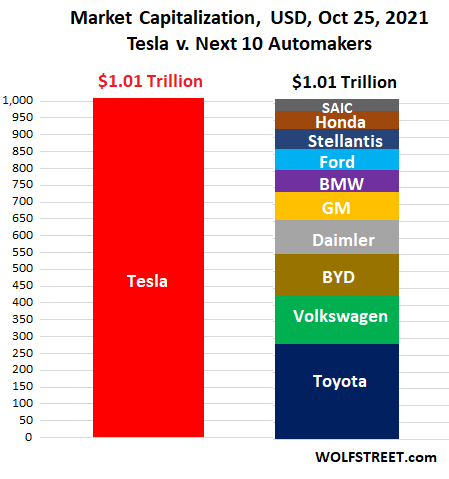Finally, it is essential to remember that maintaining this “real-life Tony Stark” persona is tremendously valuable to Musk. In addition to the ego gratification (and we have every reason to believe that Musk has a huge ego), this persona is worth hundreds of millions of dollars to Musk. More than any other factor, Musk’s mystique and his ability to generate hype have pumped the valuation of Tesla to its current stratospheric levels.
"Our cars are... semi-sentient robots on wheels"
Here's the route we drove. Nothing crazy. We didn't even film all of the interventions. I have drives like this every time I use it, regardless of what x.x version it's on. THIS is what Elon is saying will be Level 4 this year. THIS was supposed to be robotaxi in 2020. pic.twitter.com/mJyRmdUqpb
— Taylor Ogan (@TaylorOgan) February 1, 2022
$TSLA FSD software is nowhere near Beta level. Beta means that development is complete and all functionality is implemented. Beta is a production release candidate and only requires intensive testing by expert users. Clearly this is not the case. https://t.co/mo6D6Df9iN
— CoverDrive (@CoverDrive12) May 25, 2022
The National Highway Traffic Safety Administration currently is investigating 42 crashes involving robot-controlled automated driving systems. Of those, 35 are Tesla vehicles and seven are from other carmakers....Tesla has been selling Full Self-Driving with a growing list of features since 2016. In recent years it’s been increasing the number of people it allows to use its “beta” version. In Silicon Valley parlance, beta means a program that functions but may contain bugs and isn’t ready for broad public release.On YouTube, Tesla customers testing the technology on public roads continue to post videos that show it quickly veering into oncoming traffic over double-yellow lines, failing to stop for semi-trucks making turns in front of the vehicles, heading toward metal poles and pedestrians, and much more.In compliance with DMV regulations, companies such as Waymo, Cruise, Argo, Motional and Zoox have used professionally trained test drivers as a safety backup while testing their own autonomous-driving systems. The companies report all crashes to the DMV and also report what are known as “disengagements,” moments when the robot system fails or otherwise faces a situation that requires human driver intervention.Tesla’s exemption from those regulations is a matter of definitional parsing by the DMV. The agency, through public documents and prior statements by its media relations department, has said Full Self-Driving is a driver assist system, not an autonomous system.The feature falls “outside the scope of DMV autonomous vehicle regulations” because it requires a human operator, Gordon told Gonzalez in a five-page letter in January. He noted that DMV regulations apply only to fully autonomous cars but said the agency would “revisit” that stance.
Retweeting for 🍿 prep. Musk doc tackles Tesla safety, Twitter fans. What to know - Los Angeles Times https://t.co/npu5NEzokl
— Russ Mitchell (@russ1mitchell) May 21, 2022
"Crash Course" is a collaboration between FX and the New York Times, and while I'm no fan of the paper (stick with the LAT or the WP), their head automotive writer, Neal Boudette, is very good and has been one of the best reporters on this story.
We've got regulators and aggressive reporters. How about a senate candidate? Even I didn't have that one on my bingo card.
.@elonmusk, is your @Tesla Full Self-Driving software just a trillion dollar Ponzi scheme? Did you become the wealthiest man in history by swindling customers and investors?
— Dan O'Dowd (@RealDanODowd) May 24, 2022
Here's the story, in your own words:#ODowdForSenate pic.twitter.com/HpG0NF9FVK
Why is FSD falling behind the rest of the pack? The long answer is very long, but the short answer is computing power and LIDAR
I know Value Dissenter, an expert in this field and highly trustworthy. @SenGonzalez_33 https://t.co/f8k5RePMHA
— Russ Mitchell (@russ1mitchell) May 22, 2022
And to be clear, small increments are not good enough.
— Value Dissenter (@ValueDissenter) May 22, 2022
We've all seen the videos of the $TSLA car veering into oncoming traffic (or, in Gail's case, going the wrong way on a 1-way street).
The car just ran out of compute.
From the testing I saw, lanes were first to go
(11/n)
Their stack is optimized to protect PR disasters:
— Value Dissenter (@ValueDissenter) May 22, 2022
- Don't hit pedestrians
- Don't miss stop-signs or traffic lights
- Don't hit other cars
- Don't drive off the road
- Don't drive outside your lane
If all your compute is going to scenarios 1-4... good luck
(15/n)
Nearly zero compute goes to things like traffic lights, or even traffic signs/markings, because the AV companies have already mapped out where all of them are
— Value Dissenter (@ValueDissenter) May 22, 2022
And those are scenarios that take a lot of compute. 99.999% precision isn't good enough for a stop sign, period
(18/n)
There is, as the saying goes, always a tweet.
LIDAR is a seductive local maximum. SpaceX designed & built them to dock with ISS.
— Elon Musk (@elonmusk) February 25, 2022
However, the road system was designed to work with biological neural nets & eyes, so a general solution to self-driving necessarily will require silicon neural nets & cameras.
Real-world AI.
We have been talking about the rise (and hopefully fall) of the Silicon Valley tech messiahs for about ten years which has required a lamentable amount of time to be spent on Elon Musk. Based on that I am reasonably certain he doesn't really understand the terms "local maximum," "neural nets," or "AI," but the valuation of Tesla depends on people thinking that he does.


No comments:
Post a Comment